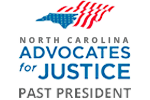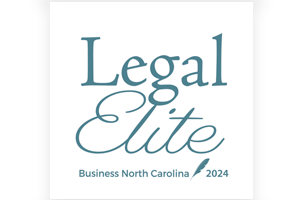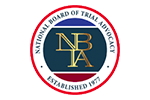YOUR LAWYERS.











Insurance Defense Lawyer – John Nunnally – Part 4
Insurance Defense Lawyer John Nunnally joins Law Talk with Bill Powers, discussing:
- The Practice of an Insurance Defense Lawyer
- Professionalism
- Trial Strategies
- Professional Development
Bill Powers: Yeah, at Campbell Law School. And he said, “Well, I notice you do it for opposing counsel too.” And I said, “Yeah. I was always told a couple of different rules. When a jury is standing up, you’re sitting down. When the judge is standing up or talking to you, you’re standing up. And when opposing counsel is standing up, as a courtesy, you’re supposed to stand up.” And he said, “Stop doing that.”
John Nunnally: That’s so funny. That’s not my experience. My experience has been, when I was there… There weren’t a lot of Campbell grads West back then. We were only like the 10th class to come out of Campbell. And you’re right. They drilled that into us. I would always ask, “May I approach the bench?” And then, later, I was in court one day. I had just gone and I’d asked to approach and done everything. I was just getting my paperwork filed. And this other attorney went behind me and walked up to the bench to see the judge. And the judge stopped him going, “Excuse me, have you asked to approach?”
And he was looking around kind of startled. I think the judge liked the fact that I had exercised that deference and formality to them. It was just pretty funny because you’re right. You always say, “May I please the court?” And stand all the time, and you’re different. I think that pays dividends on most courts. That’s interesting a judge didn’t like that because I think they like the fact you’re showing the respect. But I’ve got to tell you, you say that, and I will remember this, I learned this during Campbell orientation and I tell every new attorney that we hire. And even as an [inaudible], I’ll tell them, is during orientation, one of the attorneys who came in and spoke to us at Campbell said, “When the map and the terrain differ, follow the terrain. You will see attorneys follow a map right off the edge of a cliff.”
And I was just thought that was interesting. I have seen that in court more times than I can tell you. You can tell what the judge wants. You can see and read the courtroom and what’s happening. They will just fall off the terrain with an argument or a position that clearly has no interest to the judge or the court or the jury. And it’s like, “What are you doing? Why are you emphasizing this point?” It’s bizarre to see. I can’t tell you how many times I have seen situations where you’ve got to read and listen to what the judge is telling you about how different…
Like you were talking about the clerks giving you advice. I mean, I’m always receptive to advice from clerks and bailiffs. Bailiffs I find to be incredibly helpful on what to emphasize. But it’s always interesting to me that 30-something years later, I remember that so well, and I’ve seen it so many times in practice, unless you’re prepared to take a trial, a case, definitely to the court of appeals, which early on you probably are not on most of your trials, you make your motion for the record, and then you go on and make your objections for the record. But you don’t irritate the judge to the point he’s ready to throw you in jail.
Bill Powers: That’s a great point. In fact, I don’t know if you know who he is, a guy named Gordon Winehouse. He was an adjunct at Campbell and he worked as a clerk for Chief Justice Exum. He’s the premier appellate person in North Carolina, really in my mind. I think I was teaching a seminar somewhere and Gordon was attendance, which is always a little bit nerve wracking when you have a former professor sitting in your class who knows more… Has forgotten more about the law than you ever learned. When I get nervous, I crack lies.
There was a commentary about preserving the record, and I said, “Well, yeah, that’s what I’m sure appellate lawyers thank, but there’s a substantial difference between the reality of a courtroom trial and what’s on a transcript.” There’s actually an instruction, when the judge has given instructions to juries, assuming you use a jury now. We’ve changed that a little bit, at least in criminal law. And it says that you’re not to take any meaning from any expression on my face or anything I’ve said. And there could be some substantial, non-verbal. Some shade throwing, if you will, from the bench. And sometimes preserving the record is incongruent with ticking off the judge. It’s a balance, I think is fair to say.
John Nunnally: It’s so true. I’m actually glad that like Courtroom TV and these other shows are on for people to see, because when you read a cold record on appeal or a case, you’re like, “How could a jury have done that?” Or, “How could a court have decided that?” But yet, if you’re actually in the court and you see what’s happening, or you watch the expressions of some of the witnesses… I will never forget one. It was one I just watched. We had an excess policy so I just had to be in the courtroom and watch. But it was a doctor had admitted operating on the wrong vertebrae. Okay. You think, “Wow, this one’s going to be bad.”
The plaintiff was so horrible. I cannot tell you how bad she… The jury came back with no negligence after he admitted operating on the wrong vertebrae. By the end of that trial, I had no doubt the doctor was going to win because she was stirring testimony. She’d be mimicking or talk friends in the audience in a courtroom. Oh my gosh, no one was going to give that woman money. By the end of it, it was just incredible. I can’t believe the plaintiff’s attorney didn’t keep her in better control, or maybe couldn’t and just had to go through the motions.
But you’re right, the non verbal is so crucial. And I tell that to all my clients [inaudible]. One, I’m trying to listen to the evidence as it comes in. I can’t really have them talking to me a lot. So I’ll hand them a pad of paper and say, “Take notes.” And I will remind them that the jury is watching them. During all the testimony, they’re going to be looking over at them. Are they engaged? Are they’re asleep? Are they acting incredulous? They just need to be acting attentive and polite and not overreact. And if there’s anything they want to tell me, make a note and we’ll talk about it during a break. But I cannot have them whispering in my ear during testimony because then I’ll miss something. And they cannot be over there acting all incredulous about testimony because they’re going to look bad to a jury.
Bill Powers: Absolutely. And in fact, I call those heads-down lawyers. And we see this a lot in district court where people are following a script so tightly during the trial that they’re not watching either the judge or the jury to see how they’re reacting to the evidence. We used to have a jurist in Charlotte. I don’t know if you knew him, John, this guy named Bill Scarborough, amazing judge. Actually fought in the Battle of Bulge. I used to walk into the courtroom and he’d say “Good morning, Stretch,” because I’m taller. But he would holler out Latin maxims to let you know what he was thinking.
He would say, [Latin], and, “I’ll let it trickle to the jury,” and things like that. And I call it heads up lawyering, is like a conversation. Instead of thinking of your next question, consider for at least a minute the answer that you’re given.
John Nunnally: Yeah. I write out my questions to a good degree because, one, it helps me organize them so I know keep the topics [inaudible] together as you walk them through what you want, either direct or cross. But I do try to make sure I’m not just reading because, you’re right, you can tell when attorney is just reading versus following up on the questions. And they’ll ask a question that gives you a great opening or a great segue that people are interested in, and they just go right back to the script.
But, at the same time, I like to have a script in case you’ll be going along in a trial sometimes and then you’ll get to the end of a point you want to make, and then you need to get back on track. It’s nice to have your questions in front of you real quickly, and you can make sure you’ve covered all of your questions that you need to cover during your cross or your direct, so that you have it for your arguments and your closing argument and your evidence. It’s a nice checklist to have. You’re right. You can’t just follow it blindly, and it’s painful to watch attorneys do that at times. But it’s also painful to watch attorneys who just fluster around and aren’t very organized.
Bill Powers: Right? And there’s theming on a case, and I have a friend who always says that preparation trumps brilliance every time, meaning that there’s no substitute for preparing a case.
John Nunnally: That’s true. It’s funny to me watching some defense attorneys, especially when I’ll have like multiple defendants or something, who will basically just regurgitate everything the plaintiff has said and re-ask them question. Why are you just letting him reemphasize their testimony? If I cross-examine someone, I try to make sure that it is for something that I want to use in closing argument, or it’s an impeachment point that I’m trying to make, or something of relevance like that. I’m not just going to have them…
I can have a short cross, I don’t care. I’ll get in and make 10 points and get out. I don’t need to sit there and spend an hour regurgitating everything that they just went over. I don’t understand why people think length is somehow equivalent to quality.
Bill Powers: Sure. The more the words, the less than meaning. I had a judge one time say, “Mr. Powers, when the horse dies, get off.”
John Nunnally: Well, I do that on opening too. I mean, I have seen plaintiffs, and I’ll blame plaintiff’s attorneys on this. I don’t see defense usually doing this as much, doing such a long opening that the jury is going to sleep during opening, we’re going to say. I mean, it’s like they’re trying to put on their entire trial during opening. I try to get up and make a few points and sit back down and get onto the trial because I hopefully I’ve already done my opening during a jury selection. I hopefully have prefaced the entire case already.
Contact Us
- Free Consultation
- 704-342-4357
Personal Injury Law
- Drunk Driver Accidents
- Car Accidents
- Passenger Injuries
- Rear End Collisions
- Subrogation and Insurance Issues
- Bicycle Accidents
- Negligence is not an Accident
- Are Recorded Statements Required?
- Carolina Commercial Vehicle Accidents
- Accidents with Police Cars and Ambulances
- Contributory Negligence in North Carolina
- Discovery Sanctions
Client Reviews
I am so fortunate to have had Bill Powers on my case. Upon our first meeting, Bill insisted that through the emotions of anger, sadness, confusion, and betrayal that I remain resilient. He was available to answer questions with researched, logical, truthful answers throughout our two-year stretch...
I contacted over 20 attorneys and Bill Powers was the only one that got back to me and was willing to help. He was kind and professional. He helped me get answers that I have been trying to get for years. I am so thankful for all his help and would recommend him easily. Simply FANTASTIC.
Bill Powers contacted me very shortly after I submitted an inquiry. He is incredibly knowledgeable about laws and all the requirements in North Carolina. When working with him, he patiently answered any and all questions I had in great detail. I always had the feeling he was looking to help ME, and...
Let Us Help You!
- 1 Over 28 Years of Experience
- 2 Results Oriented
- 3 We Will Fight for You

